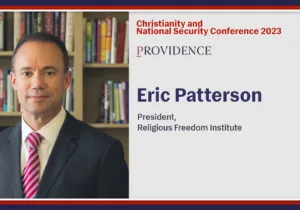I see pro-lifers use the concept of being “pro-life” as a general approach to political ethics across a number of political and social issues. Recently, Colorado abolished the death penalty, causing many to cheer this as a great accomplishment for being consistently pro-life. The criticism often arises that American alliances with autocratic regimes are a contradiction for conservatives or Christians to accept, given their pro-life commitments. This was especially true with the Jamal Khashoggi killing in 2018. Many who denounced Saudi Arabia for assassinating the Saudi dissident journalist argued the US alliance with such a repressive regime was morally inexcusable. Some went so far as to say this was reason to foreswear the alliance.
Russell Moore recently penned an op-ed in the New York Times along similar lines, arguing that Christians must abandon any consideration of the economy if it endangers the health of the vulnerable. Moore writes, “Still, each human life is more significant than a trillion-dollar gross national product. Stocks and bonds are important, yes, but human beings are created in the image of God.” Others have taken up the question of what it means to be pro-life amidst the complicated decisions that the president and other politicians make with regards to balancing control of the coronavirus with keeping the economy from collapsing.
Being Pro-Life is Not Straightforward
Many think that being pro-life on an issue means choosing the position that honors and enhances human life. But that position is vague and often assumes rather than clarifies. For instance, Moore’s statements about the value of each human life are absolutely right in sentiment, and I share his concerns about the tendency to run roughshod over the vulnerable, elderly, unborn, and voiceless. Yet he seems to embrace an absolutist position that ponders crashing the entire American economy rather than jeopardize a single human life. This is a false dichotomy. What such positions deserve in admiration for its moral integrity deserve an inverse proportion of criticism as a real policy. To be a steward of the common good is to be a steward of the whole common good, of which health of the population is a part. What good is preserving a life if the entire means by which we preserve life are absent? The two must be held together. Being healthy and alive are not the only goods that must be sustained in society. It is completely rational and humane to consider the survival of our economic wellbeing along with the protection of our vulnerable as two important moral factors. Protecting the economy is not merely making sure we have material abundance, but whether we sustain businesses that built and sustained communities and society. If the extremity of our response decimates small businesses in the name of incurring no risk, then that would not be a defense of human dignity, but fanatical devotion to health at any cost.
To be pro-life requires a complicated calculus that takes a number of moral principles into consideration as well as their practical implications. Part of that calculus has to be the protection of the livelihood of citizens to whom the government is primarily obligated to serve. The government makes all sorts of choices on a regular basis where it will and will not devote its considerable resources. It makes sense in this time of crisis to devote massive resources to caring for the sick, but that cannot be the sole concern. Asking what will come of this policy is both prudent and humane.
How Do We Choose?
Another problem with using pro-life as a designator of one’s position is that it does not really help one choose between conflicting goods. With foreign policy it is a truism that more often than not the choice is not between a good and bad option. Usually it is between three to four bad options, and maybe only one or two that are actually possible. How does the pro-life position, in its more idealistic form, ponder the nature of human reality in this domain? We can all cheer the latest papal pronouncements about seeking peace in the Middle East or ridding the world of weapons of mass destruction, but the options laid out, especially by the current pontiff, are highly impractical, at best, and pie-in-the-sky at worst.
The moral denunciations that occasioned the Khashoggi murder, while understandable, seemed incapable of pondering the actual options available to the American government. What is more important in the Middle East: opposing the Saudis for a brutal killing or opposing the Iranian regime, which sows death and destruction across the region? Both regimes are notorious for their abuse of civil liberties. On what principle on a pro-life position do we make such a decision? Do we add up the numbers of dead? Do we look at the treatment of their own citizens? Do we look at the stated and implicit aims of various regimes? Do we consider laws that uphold human dignity? Both regimes are morally repugnant for different reasons. A simple pro-life analysis does not yield much fruit or shed much light on how the government should act in foreign policy.
Personal Morality Is Not Political Ethics
The pro-life position focuses on the dignity of the pre-born child. It is a straightforward moral argument. But this relatively simple moral logic does not easily transfer to more complicated political issues. Sustaining rule of law is essential for protecting human dignity. Peace and order are prerequisite for the thriving of any society. Pursuing justice across society is essential. But it’s not clear there is a line of reasoning from the pro-life position to these broader goods of society.
How we interact on the personal level cannot be judged on the same moral basis as we do on the national level. We are not backsliding into relativism or consequentialism here. Context matters. The moral terrain and obligations incumbent upon actors in any given scenario will shift given the roles and spheres where we are operating. In virtue of their position, parents are obligated to act in certain ways toward their own children that they are not toward other children.
Politics is similar. Evangelicals often resort to simplistic and moralistic lines of reasoning when it comes to political issues. Find Bible verse; quote Bible verse; assume Bible verse expresses timeless moral truth simply applied; rinse and repeat.
Furthermore, our actions taken nationally and internationally are much more complex, so the practical calculus in our reasoning must also be more aware of all the variables. Those in charge of the Food and Drug Administration, Department of Health and Human Services, or Department of Defense cannot merely project their own personal morality onto the workings of giant public organizations with different purposes requiring certain amount of expert knowledge in order to make the right decisions.
We can often judge with some accuracy how our actions will produce certain outcomes with much higher probability in interpersonal relationships because we know the people and the variables are less numerous and more controllable. We have sufficient knowledge, and our understanding of the possible consequences is within the grasp of our mental faculties. But when you are acting at the national level, a policy intended to produce good or noble outcomes can often have very negative second and third-order effects.
For example, when the Obama Department of Justice sent out their “Dear Colleague” letter on Title IX enforcement for sexual harassment, this set off a cascade of effects that resulted in the very negative effect of universities and colleges taking the enforcement of sexual harassment policies into their own hands. Rather than law enforcement dealing with issues of sexual harassment and rape, colleges set up their own quasi-judicial panels to rule on cases they were ill-equipped to handle. What started off with a good desire to solve a pressing problem ended in the warping of college disciplinary systems into kangaroo courts.
Back to Human Dignity
To bring this back to pro-life, the issue of abortion really does come down to the critical distinction of whether an individual fetus is a human life with the rights that are intrinsic to this life. While I think the label pro-life works well when applied to the issue of abortion, it is not sufficient as a catch-all for moral reasoning when applied to other issues. Human dignity is important, but how we defend human dignity is more complex and nuanced than the mere assertion of a core conviction about the value of human life. Defending human life, community, peace, order, rule of law, and justice will require not less than the conviction that human beings are intrinsically valuable, but it will require more. Much more.







 Sponsor a student for Christianity & National Security 2024
Sponsor a student for Christianity & National Security 2024